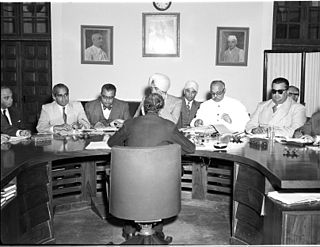Related Research Articles

Governor-general, or governor general, is the title of an office-holder. In the context of governors-general and former British colonies, governors-general are appointed as viceroy to represent the monarch of a personal union in any sovereign state over which the monarch does not normally reign in person. Governors-general have also previously been appointed in respect of major colonial states or other territories held by either a monarchy or republic, such as Japan in Korea and Taiwan and France in Indochina.
A governor is an administrative leader and head of a polity or political region, ranking under the head of state and in some cases, such as governors-general, as the head of a state's official representative. Depending on the type of political region or polity, a governor may be either appointed or elected, and the governor's powers can vary significantly, depending on the public laws in place locally. The adjective pertaining to a governor is gubernatorial, from the Latin root gubernare.
A lieutenant governor, lieutenant-governor, or vice governor is a high officer of state, whose precise role and rank vary by jurisdiction. Often a lieutenant governor is the deputy, or lieutenant, to or ranked under a governor — a "second-in-command", rather like deputy governor. In Canadian provinces and in the Dutch Caribbean, the lieutenant governor is the representative of the monarch in that jurisdiction, and thus outranks the head of government, but for practical purposes has virtually no power.
High commissioner is the title of various high-ranking, special executive positions held by a commission of appointment.
An administrator in the constitutional practice of some countries in the Commonwealth is a person who fulfils a role similar to that of a governor or a governor-general.

The Governor-General of India was the representative of the monarch of the United Kingdom in their capacity as the Emperor/Empress of India and after Indian independence in 1947, the representative of the Monarch of India. The office was created in 1773, with the title of Governor-General of the Presidency of Fort William. The officer had direct control only over his presidency but supervised other East India Company officials in India. Complete authority over all of British territory in the Indian subcontinent was granted in 1833, and the official came to be known as the "Governor-General of India".

India is a federal republic comprising 28 states and 8 union territories. The states and union territories are further subdivided into districts and smaller administrative divisions.
A commissioner is, in principle, a member of a commission or an individual who has been given a commission.
A resident minister, or resident for short, is a government official required to take up permanent residence in another country. A representative of his government, he officially has diplomatic functions which are often seen as a form of indirect rule.

Rajpramukh was an administrative title in India which existed from India's independence in 1947 until 1956. Rajpramukhs were the appointed governors of certain Indian provinces and states.
Police commissioner is a senior rank in many police forces of the world. In other jurisdictions, it is the title of a member of an oversight board.

The States Reorganisation Act, 1956 was a major reform of the boundaries of India's states and territories, organising them along linguistic lines.
The Honourable or The Honorable is an honorific style that is used as a prefix before the names or titles of certain people, usually with official governmental or diplomatic positions.
References
- ↑ The India Office and Burma Office list 1947, vol. 56 (London: India Office, 1947), p. 32
- ↑ "Council history: Appointment of Commissioners at the City of Melbourne". City of Melbourne. Retrieved 21 January 2014.